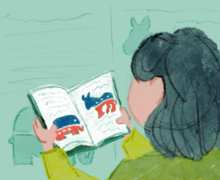Amid travel ban chaos, some positive outcomes for local refugee outreach organization
Aline Martins | Staff Writer
Rebecca Miller, director of programs for RISE, said the executive orders initially created significant confusion in the community she serves. RISE, which is located on Burt Street just west of Syracuse University, works with refugees primarily from Somalia, one of the countries targeted by both versions of the travel ban.
President Donald Trump’s travel bans have sown confusion, anxiety and fear among many refugees, including at a local refugee and immigrant nonprofit. Employees at the Refugee and Immigrant Self-Empowerment organization added, though, that the bans have also produced unexpected positive side effects.
Trump signed an executive order earlier this month restricting travel among refugees and from six Muslim majority countries. The order, which has since been blocked by a federal judge, is similar to the original travel ban, which was shot down in federal courts. The new ban’s future is uncertain, as Trump and the United States Department of Justice could choose to appeal the judgement or let the travel ban die.
Rebecca Miller, director of programs for RISE, said the executive orders initially created significant confusion in the community she serves. RISE, which is located on Burt Street just west of Syracuse University, works with refugees primarily from Somalia, one of the countries targeted by both versions of the travel ban.
Miller said the group’s executive director, Haji Adan, had people coming frequently to his house, knocking on the door and asking for him to explain what was going on. She added that the “most important thing” RISE has tried to do following Trump’s actions is calm some of that confusion.
Many of RISE’s clients still have family members living in refugee camps in Kenya while they wait to be resettled in the U.S. Because Somali people are affected by the travel bans, many relatives have not been able to join their families in Syracuse.
“I know a client … (whose) husband is still at the refugee camp,” said Khadija Muse, a bridging case manager at RISE. “And her children here, they started going through depression, anxiety — they feel like they’re never going to see their father ever again.”
Other clients have expressed anxiety about being apprehended by police and deported without warning, Muse said.
Some of RISE’s clients and employees have also encountered increased anti-immigrant and anti-Muslim prejudice in recent months, coinciding with the signing of the executive orders, Miller said. Miller said she has Somali friends who have been heckled on the street and knows kids in RISE’s after-school program who have been called terrorists at school.
As a Muslim woman who wears a hijab, Muse said she has on several occasions been cursed at and insulted for her religion.
“(I was) getting out of the car and going to my own house, and (a man) said ‘Donald Trump is coming for you, he’ll get you,’” Muse said. “And I’m just standing there … It’s insane to me.”
But despite those trends, both Miller and Muse said that RISE and other similar organizations have seen some positive changes in the aftermath of the travel bans. Miller said volunteer interest from the community increased after the executive order. She said she got five emails a day from people wanting to volunteer for the week after one of the orders was issued.

Wasim Ahmad | Staff Photographer
The increased engagement has allowed RISE to expand its after-school program, which provides homework help and games for primarily Somali students at local elementary schools.
Miller said this increased level of engagement is great for both the volunteers and the refugee community.
“I just feel like if you are a university student at (SU) for four years, and you don’t ever interact with the new American population here, then you’re missing out,” Miller said. “It’s such a rich experience, there’s so much to learn, there’s so much for students to give and there’s so much new Americans can gain from the talents and efforts of volunteers.”
Miller also noted that some organizations that represent groups targeted by the travel bans, such as the Masjid Isa Ibn Maryam, a mosque on Syracuse’s Northside, are trying to reach out to the larger community to combat the prejudice their members have experienced in recent months.
“I think the mosque wants to … invite people to learn about what they do, so there aren’t misconceptions floating around about what Islam looks like and what Islam believes,” Miller said.
Miller said that not all of RISE’s clients are worried about Trump. Some support the president, hoping his policies will create jobs in Syracuse.
Ultimately, she said the fallout from the travel bans has, in some ways, breathed new life into RISE and other organizations like it.
“I just think there’s been a new energy behind what we’ve been doing, for the staff here but also for the clients,” she said. “I would say thank you to the community for the support we’ve been getting since the executive order.”
Published on March 19, 2017 at 9:29 pm
Contact Madeleine: mdavison@syr.edu





